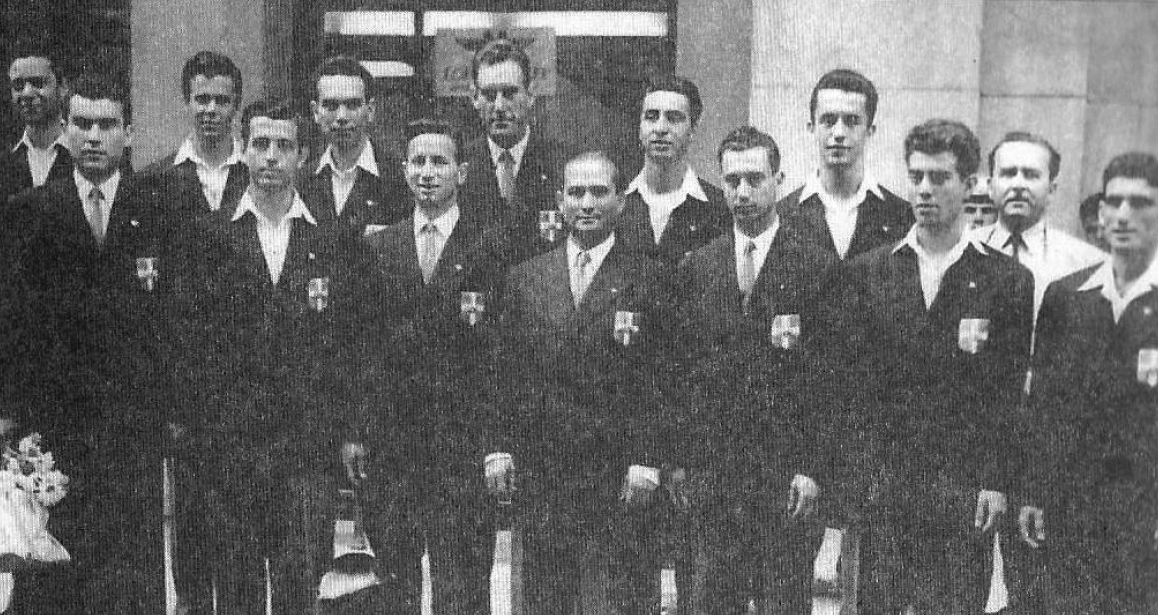Seventy-two years and eighteen “Olympics”. That’s the period between today’s tip-off between Greece and Canada in the Lille stadium and the historic first tip-off of the Greek national basketball team at their Olympic debut in 1952 in Helsinki, with names in their roster that would become “legends” of Greek basketball.
That summer (July 14 – August 3, 1952), the capital of Finland hosted the 15th Olympiad, and the Greek basketball team participated in the qualifiers for the Summer Olympics, vying for one of the six tickets to the final phase of the competition.
The national team immediately after their arrival at the Olympic Village in Helsinki (13-7-1952). From left to right: D. Papadimas, N. Milas, Th. Holevas, Al. Spanoudakis, T. Taliadoros, G. Lamprou, F. Matthaiou, Nik. Karavias (coach), G. Spanoudakis, St. Arvanitis, P. Manias, M. Stefanidis, Vl. Vallas (head of delegation), and An. Petalidis. Missing is Ar. Roubani, who was still with the national track and field team in Germany and arrived the next day. (From P. Linardos’ 2009 edition, “The Olympic Adventure of the National Basketball Team, Helsinki 1952”).
This time span of 72 years was covered by Mr. Sotiris Theologidis, journalist and author of the book “The Unknown Greek Basketball, 1942-1979” to “return” to an era when radio did not broadcast games and television had not yet arrived in Greece, to preserve photos, testimonies from the protagonists, and other documents, thus recording the first thrilling moments of today’s “official favorite” of the Greeks.
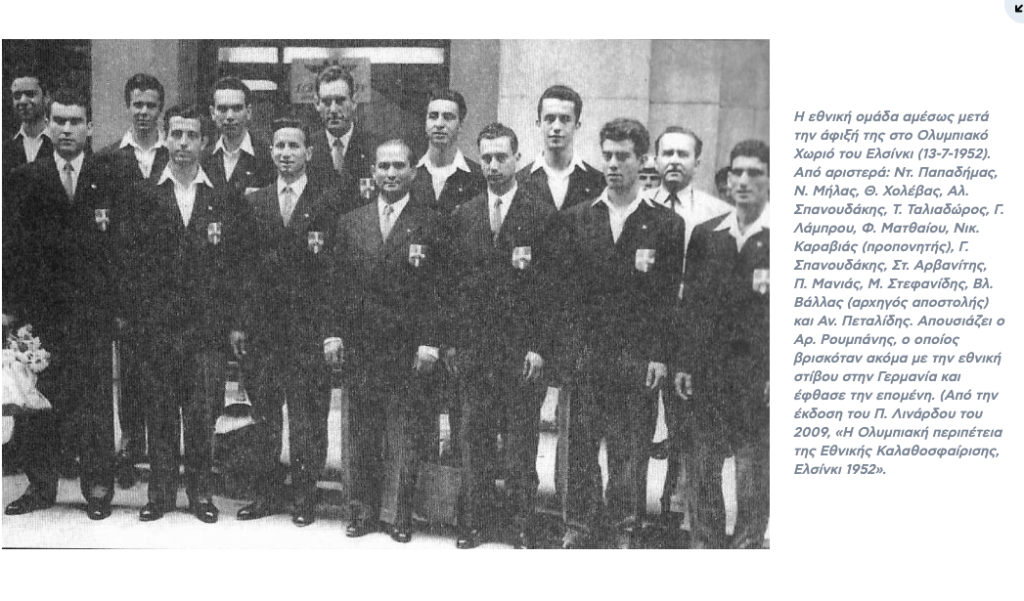
And when we say “thrilling”, we mean “unknown”, “difficult”, and from… wild times. Any successes of the national basketball team on the court indeed received the appropriate coverage from the media of the time but quickly faded into the background as they coincided with significant international and domestic events, the most important being the Korean War (1950-1953), where the two superpowers, the USA and the USSR, clashed militarily for the first time on the sides of those involved.
“The Greek team that was in Helsinki was the best national basketball team of all time… and no other team prepared as well as they did,” says Sotiris Theologidis to the APE-MPE, but unfortunately, in the end, everything went wrong…
A Team Full of Promise
In 1952, FIBA had 61 member states, and teams from 23 countries participated in the 15th modern Olympic Games in Helsinki. According to the data presented by S. Theologidis in his book, in the chapter on the Olympic Games, Greek and world basketball, the Greek team of 1952 had the best roster of the time: F. Matthaiou, the Spanoudakis brothers, Ar. Roubani, T. Taliadoros, G. Lamprou, D. Papadimas, Th. Holevas, N. Milas, St. Arvanitis, P. Manias, Vl. Vallas (head of delegation), Nik Karavias (coach), and M. Stefanidis (who also prefaces the specific book “The Unknown Greek Basketball, 1942-1979”). Among the players was also Thessalonikian An. Petalidis, whose participation was secured at the last minute.
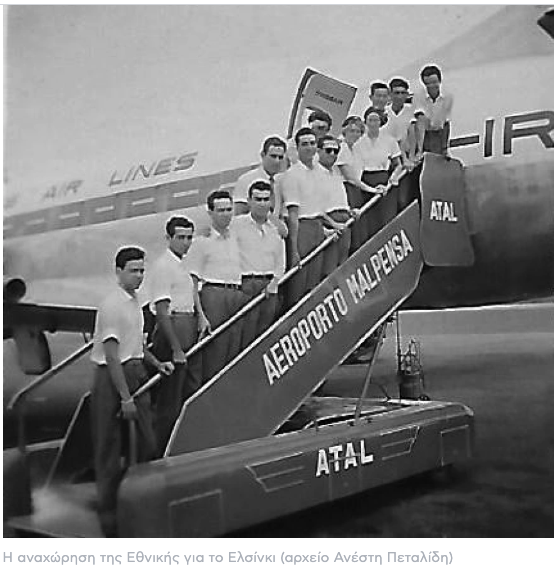
Triumph in Milan
They started preparations three months earlier, and in the Milan tournament, they triumphed. They defeated not only the host country but also other powerhouses of European basketball: France, Yugoslavia, and easily swept teams they had never beaten before: Switzerland and Turkey,” emphasizes the journalist-author.
“Athlitiki Echo” even dedicated a five-column headline after the victory over Turkey “for the fifth triumphant game” of the era. Players and the coach had even set a goal for the team not to concede more than 50 points in any game…. We should not concede more than 40 points in any game,” said team captain G. Lamprou in his statements. If we concede 37 points, we will score 38 and win. If we concede more than 50, we won’t make it…” In short, the team that could stand against any European team was called to change its systems and pay close attention to its defense. For this reason, they asked the… offensive powerhouse T. Taliadoros “to limit himself to his defensive duties only”. The internationals realized that most defeats until then were due to a lack of good physical condition as the team literally collapsed in the last 10 minutes. To improve the players’ physical condition, the assistance of the Hungarian head coach of the national track and field team, the notorious Otto Simicek, was sought.
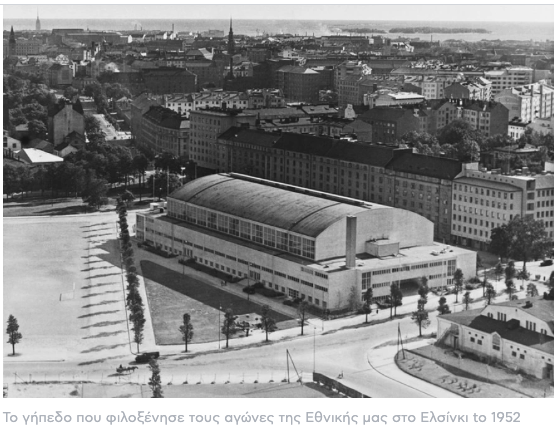
Operation Helsinki
Describing to APE-MPE the characteristics of the basketball team that would participate in the Olympics for the first time, Mr. Theologidis commented: “They were all talented. They starred in their clubs. They monopolized the offensive efforts without sharing roles and lowering their ‘ego’. That’s why before Helsinki, they changed their philosophy. The zone as a defensive system was abandoned for the first time and replaced by man-to-man, with players gaining greater endurance.”
Athletically, everything had been foreseen, but what they didn’t pay attention to was the schedule of the transition to Helsinki, as the internationals arrived in the Finnish capital and entered the fight for qualification straight from the… airport, arriving at the “TennisPalatsi” a few hours before the game. As Matthaiou and Stefanidis mentioned to the author in a later discussion about that period, “none of us had time to see the court.” Direct participation in the Helsinki Olympics was secured by the host Finland, the top 6 teams from the previous Olympics (1948, London): USA, France, Brazil, Mexico, Uruguay, Chile, the 1950 World Champion (Argentina), and the top two from the 1951 European Championship (USSR and Czechoslovakia). The next 6 spots were for those who would take the top two places in three groups, with a total of 13 countries participating. Greece was drawn in the qualifiers with Hungary, Israel, and the Philippines. In the first game against the Hungarians, the national team lost 38-75. The next day, they played against Israel and won (54-52) as the talented Roubani, a member of the track and field team, had joined the team, arriving in Helsinki a few hours before the game. Ultimately, the 1952 Olympic team, in a second game, essentially “in a second chance” with Hungary, lost the qualification from an unexpected source: free throws. The match ended 44-47. The Greeks missed 21 free throws, while the Hungarians missed only 7. Another drawback was the absence of Stefanidis, the top scorer of the impressive Panellinios team, present in Helsinki but not fully recovered from a previous injury.
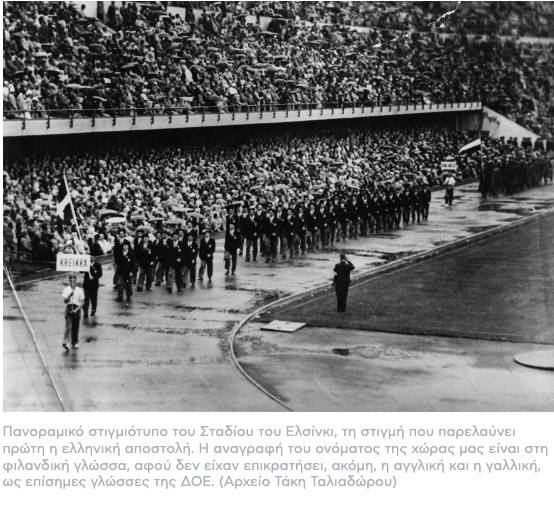
A panoramic shot of the Helsinki Stadium, at the moment when the Greek delegation marches in first. The name of our country is written in Finnish, as English and French had not yet prevailed as the official languages of the IOC. (Takis Taliadoros archive).
After the elimination, the officials of the Olympic mission instructed the players to return to Greece, except for Roubani, who as a member of the track and field team, participated in the javelin throw, even competing with tendinitis (then called “javelinitis”). The internationals resisted and stayed in Helsinki for the games (only three complied). Their refusal was considered a kind of mutiny, and they were all punished by SEGAS. The players argued that their trip should have been organized as well as their preparation, which was arduous and lengthy, and soon all the major clubs in the country where the internationals played and the university gymnast and father of Ar. Roubani, Savvas Roubani, sided with them, writes Sotiris Theologidis, and eventually, their penalty was revoked, but the national basketball team for the next 7-8 years had – not coincidentally – the smallest participation in international competitions.
Symbolically, however, Paris and not Helsinki marks the first participation of the national basketball team in major international competitions. In the City of Light, where the current Olympic Games are being held, the national basketball team made its first official appearance – after WWII – in May 1951 at the European Championship, with a total of 29 countries participating. Almost all of the above-mentioned members were part of that team. That participation is recorded as the first real “crash test” of the Greek basketball team.
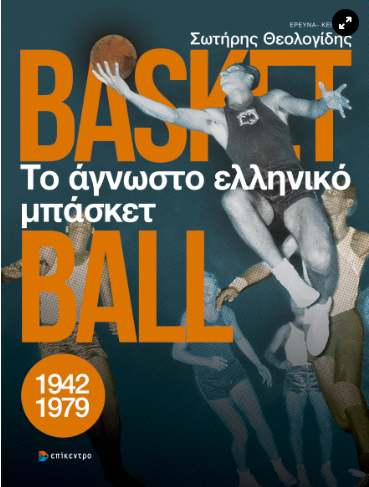
30-second Ball Possession
The book on “Unknown Greek Basketball” also covers the history of World Basketball, for which the Helsinki Olympics (1952) marked a turning point as it marked the end of an era. This is because, until then, under the existing regulations, each team had the right to hold the ball for an unlimited time. In the final of the 1952 Olympics between the USA and the USSR, the Soviets, to avoid losing by many points
Ask me anything
Explore related questions
